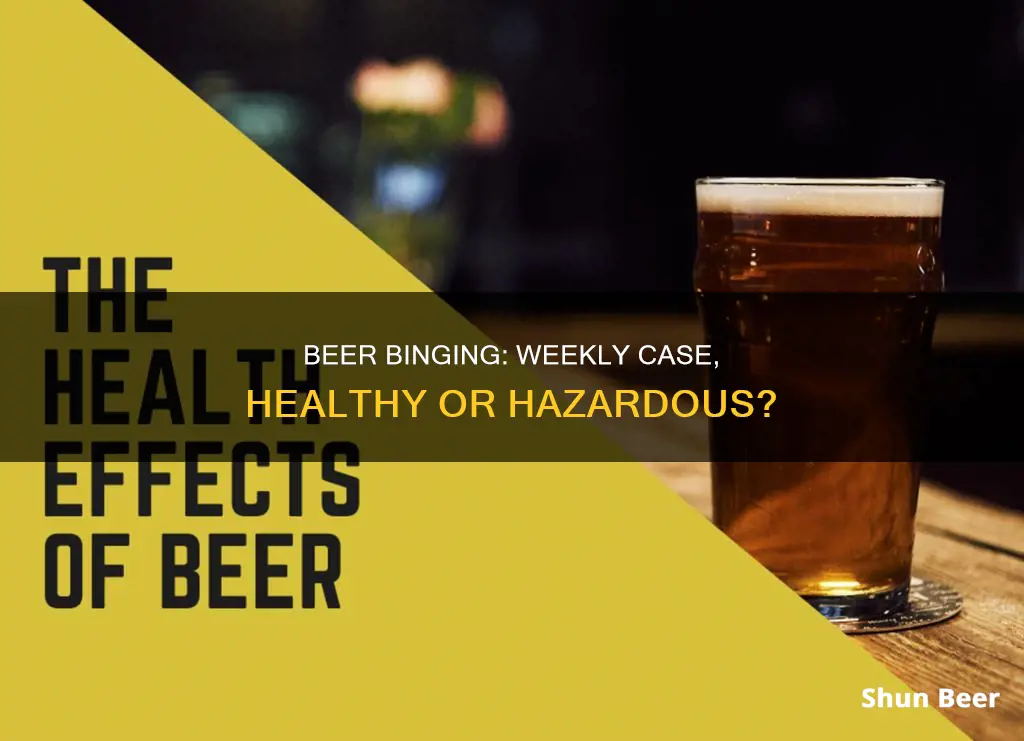
Drinking a case of beer a week, which is considered heavy drinking, can have serious negative impacts on your health and longevity. Heavy drinking is defined as consuming at least 15 drinks per week for men and eight or more drinks per week for women. The immediate and long-term consequences of drinking a case of beer a week include weight gain, liver problems, sleep disorders, dehydration, weakened immune system, increased risk of chronic diseases, nutritional deficiencies, impaired cognitive function, mental health issues, and relationship and social consequences. These effects can lead to a decline in overall quality of life and even premature death.
| Characteristics | Values |
|---|---|
| Number of beers in a case | 12 |
| Health consequences | Liver damage, chronic diseases (heart disease, high blood pressure, cancer), nutritional deficiencies, weight gain, sleep disorders, dehydration, weakened immune system, blood sugar dysregulation, etc. |
| Mental health consequences | Impaired cognitive function, depression, anxiety, etc. |
| Social consequences | Strained relationships, social isolation, decline in overall quality of life |
| Financial consequences | High costs of purchasing, impulsive spending habits, neglecting financial responsibilities |
| Legal and safety concerns | Increased risk of engaging in risky behaviors, impaired judgment, drunk driving |
What You'll Learn

Liver damage
Drinking a case of beer a week is considered heavy or "at-risk" drinking. This means that drinking a case of beer a week puts you at a higher risk of developing health problems, including liver damage.
Alcohol consumption is one of the leading causes of liver damage. When liver damage occurs due to alcohol, it is called alcohol-related liver disease. The liver's job is to break down potentially toxic substances, including alcohol. When you drink more than your liver can effectively process, alcohol and its byproducts can damage your liver. This initially takes the form of increased fat in your liver, but over time it can lead to inflammation and the accumulation of scar tissue.
There are three types of alcohol-related liver damage:
- Alcoholic Fatty Liver Disease: This occurs when fat begins to build up within the liver, inhibiting the breakdown of fats and causing fat accumulation. It is often asymptomatic but can cause discomfort in the liver area and unexplained weight loss.
- Alcoholic Hepatitis: This is acute inflammation of the liver, often followed by permanent scarring. Symptoms include abdominal pain, vomiting, dehydration, and acute liver failure, which can be life-threatening.
- Alcoholic Cirrhosis: This is the most advanced and irreversible form of liver damage, where extensive scarring has occurred, leaving permanent liver tissue loss. Symptoms include abdominal pain, jaundice, bleeding in the gastrointestinal tract, fluid build-up in the abdomen, and increased infections.
The early stages of alcohol-related liver disease often have no symptoms, making it difficult to detect. However, when symptoms are present, they may include pain or discomfort in the upper right side of the abdomen (where the liver is located), fatigue, and unexplained weight loss.
The best way to prevent and treat alcohol-related liver damage is to reduce alcohol consumption or abstain completely. For some people, this may need to be permanent. Other ways to improve liver health include eating a healthy diet, exercising regularly, and managing weight.
Beer and Comal River: What You Should Know
You may want to see also

Increased risk of chronic diseases
Drinking a case of beer a week can increase your risk of developing chronic diseases. Here are some ways in which this level of beer consumption can negatively impact your health:
- Cardiovascular Disease: Excessive alcohol consumption is a well-known risk factor for cardiovascular diseases, including coronary heart disease, heart failure, and stroke. Heavy drinking can lead to hypertension and atherosclerosis, increasing the likelihood of these conditions.
- Liver Disease: The liver is responsible for filtering toxins from the body, including alcohol. When overloaded with excessive alcohol, the liver can become inflamed and fatty, leading to conditions such as alcoholic liver disease and cirrhosis.
- Cancer: Drinking a case of beer a week increases the risk of developing certain types of cancer, including mouth, throat, esophageal, liver, colorectal, and breast cancer. Alcohol consumption is estimated to account for 6% of all cancers and 4% of cancer deaths in the United States.
- Diabetes: While moderate alcohol consumption may have some protective effects against diabetes, heavy drinking increases the risk. Alcohol can interfere with glucose metabolism and impair insulin sensitivity, contributing to the development of type 2 diabetes.
- Obesity: Heavy drinking is associated with abdominal obesity and can lead to weight gain. The additional calories from alcohol, combined with its ability to amplify appetite, can result in increased body fat and weight-related health issues.
It is important to note that these risks are not limited to binge drinking but also apply to consistent heavy drinking over time. Even if you are not binge drinking, consuming a case of beer or more per week is considered excessive and can have detrimental effects on your health. To reduce these risks, it is recommended to limit alcohol consumption to moderate levels, which is defined as one drink per day for women and up to two drinks per day for men.
Beer and Ulcers: Is It Safe to Drink?
You may want to see also

Nutritional deficiencies
Drinking a case of beer a week, which amounts to heavy drinking, can lead to nutritional deficiencies and other health problems. Alcohol is not essential to the human diet and is classified as a drug. It is a known depressant and is the most widely used drug globally.
Heavy drinking can cause deficiencies in several essential nutrients, including vitamins and minerals. These deficiencies can lead to severe functional impairment and tissue damage, particularly in the brain. Here are some of the nutritional deficiencies that can occur:
- Vitamin B1 (thiamine) deficiency: Alcohol rapidly reduces thiamine levels in chronic drinkers. This can lead to beriberi, a disease that affects the cardiovascular and nervous systems. Early symptoms include weakness, fatigue, and emotional disturbances.
- Folate deficiency: Alcohol interferes with folate intake, absorption, transport, and storage in the body. Folate is essential for producing and maintaining new cells. Deficiency can increase the risk of birth defects and cancer.
- Vitamin B12 deficiency: Both moderate and heavy alcohol consumption can decrease vitamin B12 levels. This vitamin is crucial for maintaining healthy nerve cells, red blood cells, and protein metabolism. Deficiency can lead to numbness, tingling, weakness, fatigue, and confusion.
- Vitamin A deficiency: Alcohol promotes vitamin A deficiency and enhances its toxicity when consumed in excessive amounts. Vitamin A is essential for vision, immune function, bone growth, and reproduction.
- Calcium deficiency: Alcohol increases urinary calcium excretion and can lead to osteoporosis, especially if consumed during adolescence and young adulthood.
- Protein deficiency: Alcohol interferes with the absorption of amino acids in the small intestine and can alter protein metabolism, particularly in the case of chronic liver failure.
In addition to these specific deficiencies, heavy drinking can also lead to a general state of malnutrition, as alcohol displaces food in the diet and interferes with the body's ability to absorb and utilize nutrients effectively. This can result in weight loss, inadequate vitamin and mineral intake, and increased vulnerability to disease.
It is important to note that the negative consequences of excessive alcohol consumption far outweigh any potential health benefits. While moderate drinking may offer some benefits, heavy drinking reverses these benefits and significantly increases the risk of various health problems.
Drinking Beer Upside Down: Does It Get You Drunker Faster?
You may want to see also

Impaired cognitive function
Drinking a case of beer a week can have detrimental effects on cognitive function. Alcohol consumption can affect the brain's communication pathways and its ability to process information. This can lead to impaired reflexes, balance, memory, and sleep. Even light drinking can disrupt sleep quality.
Research has also found a link between moderate drinking and cognitive decline. A large observational study found that drinking just three cans of beer a week was associated with higher levels of iron stored in the brain. Accumulation of iron is associated with cognitive issues, and the study hypothesized that drinking promotes cognitive decline.
Heavy drinking is associated with an increased risk of cognitive impairment and dementia. It can also lead to brain damage, including damage to the frontal lobe, limbic system, and cerebellum. This can result in impairments in working memory, mental flexibility, attention, decision-making, problem-solving, processing speed, and planning.
Binge drinking, defined as consuming five or more standard drinks in two hours for men or four or more standard drinks in two hours for women, has been linked to an increased risk of dementia.
Overall, while light to moderate drinking may not increase the risk of cognitive decline, heavy drinking and binge drinking can have detrimental effects on cognitive function.
Paleo Diet and Beer: Is It Allowed?
You may want to see also

Mental health issues
Drinking a case of beer a week, which is considered excessive drinking, can have detrimental effects on your mental health. Alcohol is a depressant, which can disrupt the balance of neurotransmitters in your brain and affect your feelings, thoughts, and behavior. While it may initially make you feel relaxed, less anxious, and more confident, these effects are temporary and quickly wear off, often leaving you feeling worse.
Worsening of Mental Health Issues
After the initial calming effect of alcohol fades, you may experience a worsening of your mental health symptoms. This can include increased feelings of anxiety and depression, as well as post-alcohol anxiety and/or depression. Binge drinking, which is consuming a large amount of alcohol in a short period, can further exacerbate these issues.
Alcohol Dependence and Withdrawal
Regular drinking can lead to alcohol dependence, and if you suddenly stop drinking when you're dependent, you may experience withdrawal symptoms, including hallucinations. Attempting to alleviate these symptoms by drinking more alcohol can lead to a cycle of dependence and worsening mental health.
Interference with Activities, Relationships, and Self-Esteem
Excessive drinking can get in the way of your daily activities, affect your relationships, and harm your self-esteem. This can create a vicious cycle, as these issues can further worsen your mental health. Additionally, the social problems arising from long-term alcohol misuse, such as homelessness, job loss, and relationship issues, can also negatively impact your mental well-being.
Permanent Changes to the Brain
Long-term heavy drinking can cause permanent changes to the brain, including problems with understanding, memory, and logical thinking. This is sometimes referred to as alcohol-related brain damage. These changes can have a significant impact on your mental health and your ability to manage your emotions effectively.
Increased Risk of Self-Harm and Suicide
People who have problems with alcohol are more likely to engage in self-harm and have suicidal thoughts or attempts. The disinhibiting effects of alcohol can lower your inhibitions and lead to impulsive actions, such as self-harm or suicide.
If you are concerned about your drinking habits or their impact on your mental health, it is important to seek professional help. This may include consulting your doctor, joining support groups, or participating in therapy to address both your drinking and mental health concerns.
Beer and Afib: What You Need to Know
You may want to see also
Frequently asked questions
A case of beer typically contains 24 beers.
Drinking a case of beer a week is considered "heavy" or "at-risk" drinking and can have serious negative impacts on your physical and mental health. It can increase your risk of chronic diseases such as liver disease, heart disease, high blood pressure, and certain types of cancer. It can also lead to weight gain, sleep disorders, dehydration, and nutritional deficiencies.
Excessive drinking can strain relationships and negatively impact your social interactions. It may lead to conflicts, isolation, and a decline in overall quality of life.
Some studies suggest that moderate beer consumption may offer certain health benefits, such as boosting heart health and increasing bone mineral density. However, these benefits are only seen with very moderate consumption—one drink per day for women and up to two drinks per day for men.
If you find yourself struggling to control how much you drink or experiencing negative consequences as a result of your drinking, such as relationship problems, work issues, or legal trouble, it's important to seek help.







